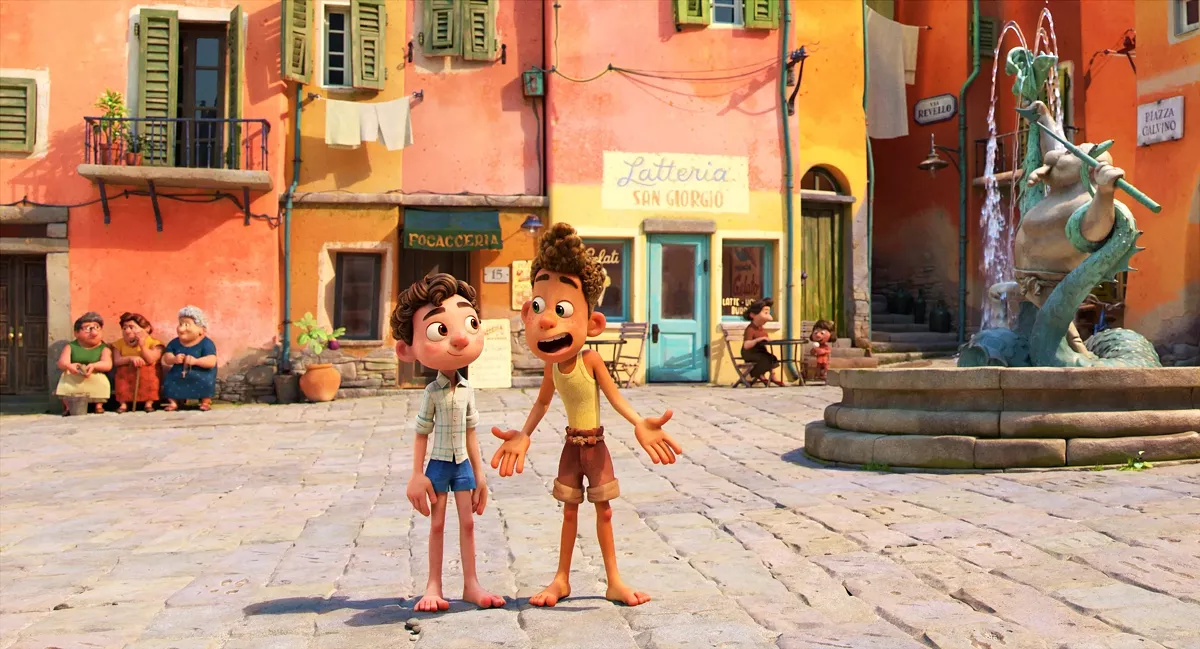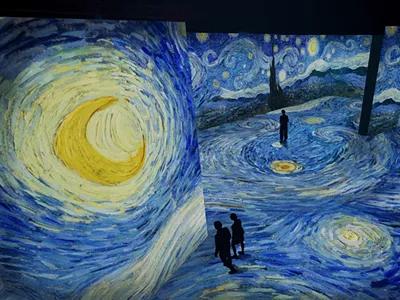"It's bad and I'm not supposed to be up here," says Luca's title character of his version of the world in which we live. Set in a small strip of coastline on the Italian Riviera, Genoan director and veteran animator Enrico Casarosa presents human society here as a pastoral, largely innocent world of sensory (but never sensual) pleasures that's welcoming, breezy, and easy to take in. Made up of finer renderings than most Pixar stuff, the world here feels shaped by mid-century rounded designs, the figures featuring less of Pixar's signature bloated proportions or doggedly realist textures and approaching something more approximate, loosely cartoon — like claymation — with most everything presented in a soothing blue-green mediterranean palette. This space, a version of human society lacking too much complication, presents its lead characters with a problem anyway in the form of its temptations, drawing them from what they know: which world, if given a choice, do they want to be a part of? Will they remain in the realm of the safe and familiar, or take the risk — which the film struggles to make feel anything but modest — of stepping out into the unknown?
Luca himself doesn't exactly engage analytically with these questions either. More a creature of emotion and two-dimensional, gee-whiz voice acting as enacted by Jacob Tremblay, he oscillates between excited curiosity, pouting boredom, and nervous self-doubt throughout the movie's course: all obvious notes. An amphibious, scaley "sea monster" with a winding tail, a crown of plantlike fins upon his head, and, somewhere, gills, he appears as a wide-eyed human kid with a head of impeccable curls when not exposed to water. For Luca, this ability is a fresh discovery; he's long been part of a dull, quiet community which isolates itself from the world above the sea despite residents' ability to venture further. This communal stance is upheld largely at the behest of his overweening parents, whose worries about human society aren't harbored without cause; sea monsters have been a rumored presence in the nearby fishing village of Portorosso for what feels like centuries, sighted by fishermen who stand guard against them with harpoons.
Less paralyzed by all this is haughty, blustering Alberto (Jack Dylan Glazer), another monster kid, longtime loner, and obvious bullshitter ("I basically invented it," he says of walking on land). After bumping into Luca while scavenging flotsam on the ocean floor, he pulls him from the sea on a whim and takes him through his own remote, isolated form of surface life in a clubhouse-like abandoned tower. Over the following days, Alberto helps Luca sneak away from his underwater work (basically shepherding fish, an unimaginative flourish on Pixar's part), initiating him into the pleasures — ranging from stars to books and magazines to motorized scooters — of our forbidden world. If that sounds suggestive, it's because it is; the pair forge a bond in these scenes with ample homosocial overtones, ones which re-emerge at inconsistent turns over the movie's course — never to be fully treated or borne out. In its depictions of Alberto welcoming Luca into a hidden, second way of living, schooling him unevenly over long summer days in how to enact a newfound way of being, the film courts queer readings which are echoed in moments not just of the pair bonding with one another arm-in-arm at sunset, but in later scenes of passing, outing, and platonic rivalry later. While there's nothing sexual in these scenes — and needn't be — Casarosa comes close at points to depicting the kind of elusive, latent, and wholly platonic sexuality more subtly and consistently explored in Yoshifumi Kond's Whisper of the Heart, also set in Italy. While the film backs away from these suggestions pretty decisively in the scenes that follow, the spectre remains of a work that's braver, more incisive, and truer to life than what plays out here.
The story unfolds nonetheless, though, as a light allegory of difference and uneven acceptance — of collisions between intersecting walks of life — which moves to more conventional terrain when the duo venture from their tower into town. Dreaming of purchasing a Vespa to roam the land as freely as they do the sea, they fall in with Giulia (Emma Berman), a sparky triathlete and local fisherman's daughter, to compete together in a race for a sizable lump of cash. As they train with her, the pair go about a kind of closeted existence in a community (like ours) that condemns their kind, hiding their origins and nature except with one another while becoming ever more enamored of human affairs. In flashes, usually moments of threat, these tensions in how the two relate to what's around them rise to the surface – giving the film its moments of greatest heat and interest.
Outside of these small peaks, though, the movie simply doesn't hit emotionally as it ought to, conveying close connection — as is common Hollywood shorthand — with forced and empty peals of laughter, and aiming for whimsicality through unimaginative fantasy sequences. To its detriment, a film which hinges upon the progression of a friendship — queer stuff aside — struggles to achieve any kind of sustained emotional authenticity in its depiction. With Luca's character mostly confined to expressions without layers, seemingly meant to resonate with viewers not through particulars but flat-feeling universals, it seems the team doesn't understand that in writing, the universal emerges from digging into particulars — of relationships, settings, and people — not from a refusal to paint with anything but broad strokes. This leaves Tremblay marooned as Luca, and with Alberto sheltering himself behind a mesh of plainly obvious deceptions, it sometimes feels as though the creative team for Luca selected the wrong lead character. In the film that might have been Alberto, there could have been space for an exploration not of a straying mama's boy but of a truer outsider: a character with some conflicts and yearnings which even in what's here suggest an avoidance of something unknown even to himself, a mystery that lies somewhere near his core. For all its rhetoric about venturing out to unfamiliar ground, Luca's choice and depiction of its protagonist shows that its devotion in the end isn't just to lightness; it's to the familiar, acceptable, and safe.
Stay connected with Detroit Metro Times. Subscribe to our newsletters, and follow us on Google News, Apple News, Twitter, Facebook, Instagram, or Reddit.






